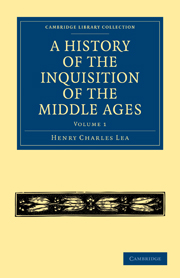Book contents
- Frontmatter
- PREFACE
- Contents
- BOOK I—ORIGIN AND ORGANIZATION OF THE INQUISITION
- CHAPTER I THE CHURCH
- CHAPTER II HERESY
- CHAPTER III THE CATHARI
- CHAPTER IV THE ALBIGENSIAN CRUSADES
- CHAPTER V PERSECUTION
- CHAPTER VI THE MENDICANT ORDERS
- CHAPTER VII THE INQUISITION FOUNDED
- CHAPTER VIII ORGANIZATION
- CHAPTER IX THE INQUISITORIAL PROCESS
- CHAPTER X EVIDENCE
- CHAPTER XI THE DEFENCE
- CHAPTER XII THE SENTENCE
- CHAPTER XIII CONFISCATION
- CHAPTER XIV THE STAKE
- APPENDIX
CHAPTER IV - THE ALBIGENSIAN CRUSADES
Published online by Cambridge University Press: 29 August 2010
- Frontmatter
- PREFACE
- Contents
- BOOK I—ORIGIN AND ORGANIZATION OF THE INQUISITION
- CHAPTER I THE CHURCH
- CHAPTER II HERESY
- CHAPTER III THE CATHARI
- CHAPTER IV THE ALBIGENSIAN CRUSADES
- CHAPTER V PERSECUTION
- CHAPTER VI THE MENDICANT ORDERS
- CHAPTER VII THE INQUISITION FOUNDED
- CHAPTER VIII ORGANIZATION
- CHAPTER IX THE INQUISITORIAL PROCESS
- CHAPTER X EVIDENCE
- CHAPTER XI THE DEFENCE
- CHAPTER XII THE SENTENCE
- CHAPTER XIII CONFISCATION
- CHAPTER XIV THE STAKE
- APPENDIX
Summary
The Church admitted that it had brought upon itself the dangers which threatened it—that the alarming progress of heresy was caused and fostered by clerical negligence and corruption. In his opening address to the great Lateran Council, Innocent III. had no scruple in declaring to the assembled fathers: “The corruption of the people has its chief source in the clergy. From this arise the evils of Christendom: faith perishes, religion is defaced, liberty is restricted, justice is trodden under foot, the heretics multiply, the schismatics are emboldened, the faithless grow strong, the Saracens are victorious;” and after the futile attempt of the council to strike at the root of the evil, Honorius III., in admitting its failure, repeated the assertion. In fact this was an axiom which none were so hardy as to deny, yet when, in 1204, the legates whom Innocent had sent to oppose the Albigenses appealed to him for aid against prelates whom they had failed to coerce, and whose infamy of life gave scandal to the faithful and an irresistible argument to the heretic, Innocent curtly bade them attend to the object of their mission and not allow themselves to be diverted by less important matters. The reply fairly indicates the policy of the Church. Thoroughly to cleanse the Augean stable was a task from which even Innocent's fearless spirit might well shrink. It seemed an easier and more hopeful plan to crush revolt with fire and sword.
- Type
- Chapter
- Information
- A History of the Inquisition of the Middle Ages , pp. 129 - 208Publisher: Cambridge University PressPrint publication year: 2010First published in: 1888



